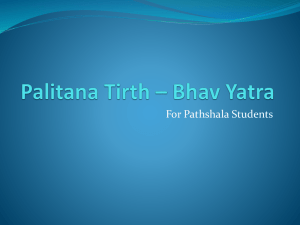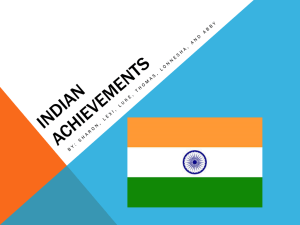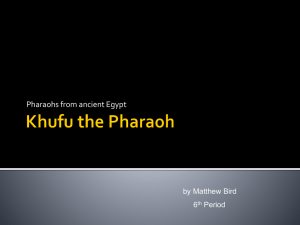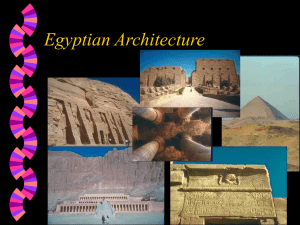Presentation 2014 - Devasthan Department
advertisement
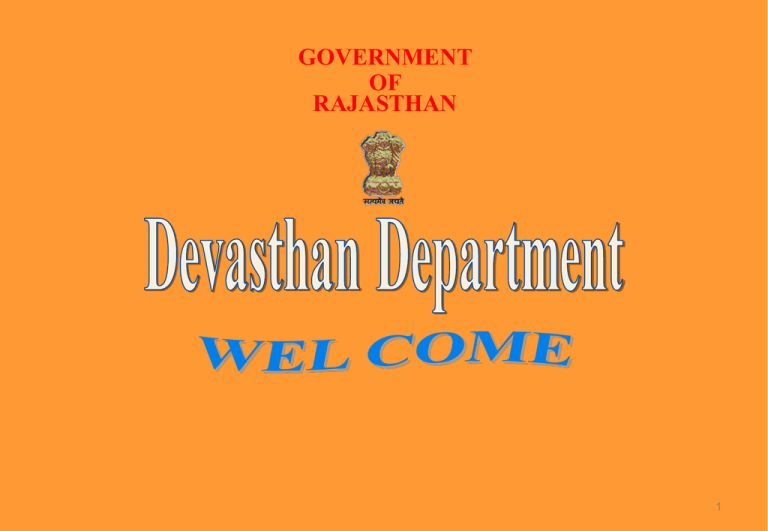
GOVERNMENT OF RAJASTHAN 1 Part I Departmental Overview Devasthan Department was established in 1949 with the formation of Rajasthan State Functions of the Department Devasthan department manages the temples, religious and charitable institutions, Dharmshalas, shrines (muths), inherited from the rulers of the erstwhile princely states at the time of their merger in to the Union of India . Department regulates Public Trusts, Registered under the Rajasthan Public Trust Act 1959. Devasthan department provides cash grant in aid and Annuity to temples and other Religious and Charitable institutions. 2 Functions of the Department (cont.) Releases subsidies to Kailash Mansarowar yatra pilgrims . Administration of Nathdwara and Sanwalia Ji Temples.(Under the Acts) Department organizes religious and cultural activities in Govt. Temples and also encourages, supports various Utsavs, Fair, Yagya organized for religious and charitable purposes. Department task includes preserving and encouraging temple culture, publishing materials related to major temples and religious places for the public and also preserves archives, to encourage religious tourism and pilgrimage. 3 Administrative Set – Up At Secretariat Level 1- Addl. Chief Secretary 2- Dy. Secretary At Department Level Commissioner, Devasthan Department, Rajasthan ,Udaipur At Divisional Level 11 Offices of Astt. Commissioners at Jaipur I, Jaipur II, Jodhpur, Bikaner, Udaipur, Kota, Bharatpur, Vrindavan (U.P.), Rishabhdev, Ajmer & Hanumangarh. At District Level 5 Inspector Offices: Alwar, Karauli, Banswara, Bundi & Dholpur. 4 Classification Of Departmental Temples/ Institutions Govt. Direct Charge These Temples and Institutions are managed through Govt. Budget. In Year 2012-13 for these type of temples total approved budget was Rs.2351.35 Lacs. Govt. Self Supporting These Temples and Institutions are managed by Devasthan Deptt. by the temples earnings. In Year 2012-13 for these type of temples total approved budget was Rs. 874.63 Lacs. 390 204 5 Details of Temples Total No. Temples /Institutions Govt. Supurdagi Category These Institutions and Temples were established by the erstwhile rulers and later they were handed over to Mahants and Pujaries for their management. 342 Dharamshalas - 9 Grant-In-Aid Temples - 10009 Annuity Temples - 48466 Public Trusts - 7550 Some of the above Temples/ Institutions are located out of Rajasthan at U.P. (26), U.Kh.(6), Delhi (1), Maharashtra (7) and Gujarat (1). 6 Part II Action Plan for 60 Days 1 To organize special cultural festivals in selected major temples. 2 Performing special Pooja-Archana in selected 108 temples/religious places. 3 To start preparation of development plan in I or 2 selected temples/religious places in each district. 4 To organize tour programmes for remaining selected applicants under the scheme, Varisth Nagrik Tirth Yatra Yojana 2013. 5 Constitution of Aadi Shankaracharya Board. 6 Formation of a corporation to organize religious Yatras within Rajasthan State. 7 To start cleaning, white washing and painting etc. in major temples of Devasthan Department. 8 To make appointments on the vacant posts of Pujaris, Sevagirs and Managers after organizing a competitive exam. 9 Action plan of Sanwliya ji Temple Board for 60 days. 10 To send proposals of strengthening the Devasthan Department at the competent level. 7 1- To organize special cultural festivals in selected big temples. This resolution is also mentioned in point no.17 of the title Tourism of “Suraj Sankalp 2013”. Organizing of special Religious/Cultural festivals on a large scale in each districts in selected one or two temples. Ensuring public participation in the above festivals by inviting religious minded persons, artists & renowned persons of the State. For the execution of the above proposals for sanction of Rs. 35.00 lacs have been sent to the finance department. 8 2- Performing special Pooja-Archana in selected 108 temples/religious places. For peace, happiness and prosperity of public at large & overall development of the state, organizing special Pooja & prayers at religious and holy places of all religious by the new government as in its’ earlier tenure. In the above programme Temples, Mosque, Gurudwaras and Monastries (Muths) and holy places of all religions are being included. Budget exists for this activity in the department. 9 3- To prepare development plan in 1 or 2 selected temples/religious places in each district. Suraj Sankalp – 2013 bears the resolution for a special plan for Mangarh Dham, Tripura Sundari, Ramdevra, Tannot, Nathdwara, Sanwaliyaji, Pushkar, Sahwa, Budhajohad, Ajmer Dargah Sharif, Nakodaji, Sri Mahavirji, Kaila Devi, Mehandipur Balaji, Diggi- Kalyanji, Beneshwar Dham and other such pilgrim centres. Commencing of detailed development plan with the selected of 1 or 2 temples from each district. 10 Photos of Mandir Shri Mehandipur Balaji 11 12 4- To conduct Pilgrimage Tours for the left outs Applicants under the Scheme Varishth Nagrik Teerth Yatra Yojana-2013 In Suraj Sankalp 2013, at page 24 point no 26 this is mentioned, M.P. and Chattisgarh State already have this scheme for senior Citizens. Under this scheme, Senior Citizens(60 years or more) of Rajasthan State can go once in their life time to the Religious Destinations outside the State as mentioned in the scheme at Govt. expense. The Selected Teerth Yatra 11 Destinations includes Jagannath puri, Rameshwaram, Vaishno devi, Tirupati, Gaya -Kashi, Amritsar, Shirdi, Bihar Sharif, Sammed – Shikhar, Goa (church) and Dwarika puri. 13 Under this scheme so far 42 Trains by IRCTC have benefited more than 39,265 pilgrims and total expenditure incurred on this is Rs. 5478 lacs (Average expense per passenger is Rs.13,500 ) Under 60 Days Plan, in January Four Trains to Rameshwaram are planned in which 4000 passengers will be benefited and in February around 6000 passengers who were absent at their previous time of journey will be benefited. This scheme has received wide applause through-out the state. Additional Rs. 8 cr. will be required for the above mentioned pilgrimage. 14 15 5- Constitution of ADI SHANKARACHARYA BOARD : Suraj Sankalp-2013 resolves constitution of “Adi Shankaracharya Board for education in Astrology, Religious Ceremonies & Rituals ( Karmkand), Ayurveda etc. Preparation of an outline of the constitution of this Board along with its activities and Submission of the same at competent level would be taken up in 60 days. 16 6. Formation of a corporation to organize religious Yatras within Rajasthan State. Suraj Sankalp-2013 (page 24/point 26) resolves for a special plan for organizing pilgrimages within the State and the Country. Such religious tours within the state may be conducted via special bus services. It is proposed to constitute a Religious Tourism Corporation in the next 60 days. The main function would be to encourage religious tourism within the State & the County. Senior officers of tourism, Devasthan, RTDC. Transport etc. could be included in this corporation. Preparation of an outline of the constitution of this Board is proposed to be undertaken in the 60 Days work plan. 17 7- Ensuring cleanliness, whitewash & Paint in the major temples of the Department. : Selection of 108 temples each from the two catefories of Govt.Direct Charge & Self Supported temples & ensuring cleanliness, whitewash. Paint & power supply to improve the ‘Darshan-system’ for the pilgrims. Proposals for budget provision of Rs. 21.60 lacs has been sent to the Finance Department for Govt. Direct Charge Temples while the Department has funds for the Govt. Self supported Temples. 18 8- Appointment of Pujaris, Sevagirs & Managers on the Vacant posts of the Department after conducting Recruitment exam for the same. This recruitment process is being undertaken after 25 years. In the 390 Govt. Direct Charge Temples of Devasthan Department posts have been created for Managers, pujaries & Sevagirs for arrangement & Seva-Puja. The recruitment process for 7 posts of Manager Grade-II, 47 posts of Pujaris & 11 post of Sevagirs has started. Recruitment on these vacant post is being done by an exam being conducted by Mohanlal Sukhadia University, Udaipur on February 2, 2014 It is proposed to issue appointment letters to the successful candidates as a part of 60 Days Work Plan. 19 Sanwalia Ji Mandfiya, Chittorgarh 20 9- 60 Days Action Plan of Sanwalia Ji Mandir Out of approved Budget of Rs.4210.06 Lacs, till December 2013 Rs. 3779.50 lacs have been spent. In next 60 days, Corridor work of the temple which is in final & finishing stage will be accelerated and completed. In Sanwalia Ji GaushalaTinshade work in progress. Out of total cost Rs. 63.79 lacs, till december Rs. 41.00 lacs is the expenditure. This work will be completed in next 60 days and structure will put to use. 21 Photographs of Sanwalia Ji Mandir Extension Works 22 10- Preparation of proposals for Strengthening of the Department for Approval at the Competent Level : The Devasthan Department through its officers & employees is engaged in the total management of Direct Charge & Self Dependent Temples & Institutions which includes Seva- Puja & management of their properties. The Department also manages & maintains 41 properties outside the State viz. 26 in Uttar Pradesh, 6 in Uttarakhand, 1 in Delhi, 7 in Maharashtra & 1 in Gujrat. The work of maintainence & upkeep of the temples is also undertaken by the Technical Staff of Devasthan Department. Earlier only 50% budget outlays for repair, maintenance and construction could be utilized for want of technical staff. 23 Presently the Department is also conducting the ‘Varishta Nagrik Tirth Yatra Yojna’ The Department has very limited resources, It also register, inspects & monitors functioning of Public Trusts. In Budget 2010-11, 34 posts were sanctioned in the name of Strengthening of department, which is grossly inadequate. There is a need for creation of more than 300 posts, it is proposed to send proposals for the same under 60 days work plan. 24 Part-III Important Works to be Undertaken By The Department in the next 5 years 1- Improved Management of Devasthan Temples & Major Temples Of the State: Devasthan Department manages 600 Direct charge, self supported Temples. There are many major temples in the State where pilgrims congregate in large numbers. Some such important temples are; Govind Dev Ji, Mehandipur Balaji, Khatushyam Ji, Brahma Ji Pushkar, KelaDevi etc. 25 At many places there is a total lack of parking, cleanliness, market and darshan related system, for which grievances & demand for improvement and augmentation of facilities are received & Devasthan Department is presently unable to fulfill this role. In many South Indian States like Karnataka, Andhra Pradesh, Tamilnadu etc. Major temples are run through public participation. Hence, on the same lines for increased public participations, it is proposed to constitute district level committees or committees for major temples for improvement in the system. A few of the major temples could be brought under special enactments on the pattern of Sanwaliaji. 26 2- Registration of Public Trusts There are many charitable & Religious Institutions and Trusts, registered under the Society Act viz “ Khole Ke Hanuman Ji” Jaipur. Under the Rajasthan Society Act 1958 institutions operating under no profit and no loss should be registered. Religious and charitable activities need to be run by public trust registered under the Rajasthan Public Trust Act. Such institutions and Temples are present in large numbers. Therefore their registration under Rajasthan Public Trust Act 1959 is mandatory. Presently 7750 Temples and Institutions are registered under this Act. It is proposed to register these wrongly registered temples etc. under the Rajasthan Public Trust Act 1959 27 3- Execution Of Suraj Sankalp Yojna-2013 Constitution of Adi Shankaracharya Board. Preparation of Temple Town Act. Construction of covered pathways with plantations along the roads leading to holy places for pilgrims. Establishment of town dedicated to great saints for dissemination of information related to their teachings and life. Integrated development of various pilgrim centres. Preparation of scheme for conducting pilgrimages to various religious places in the Country. 28 NATHDWARA TEMPLE BOARD, NATHDWARA 29 4. Nathdwara Temple TEMPLE DEVELOPMENT PROJECT PHASE-I, NATHDWARA Total amount of Rs. 51.00 Crores was sanctioned for the work, expenditure incurred so far is Rs.37.50 Crores. This is a five storey building. The Ground & First Floor of the building is being constructed to provide facilities like Waiting-Halls, Toilets with Lockers etc. Other three stories are for facilities of Vaishnavs and other uses. At present the building is at its final finishing stage. During coming 60 days the progress of work will be expedited to complete the finishing works of Ground and First Floor. 30 TEMPLE DEVELOPMENT PROJECT PHASE-II, NATHDWARA Total sanctioned amount is, Rs. 20.00 Crores and the expenditure incurred so far is Rs.13.38 Crores. This is four storey building. All the Floors of the building are constructed for use of SevaDepartments. At present the structure for three stories is complete and fourth floor work is in progress. During coming 60 days the progress of work will be expedited. 31 TEMPLE DEVLOPMENT PROJECT PHASE-I & II Photos 32 5- COMPUTERIZATION OF THE DEPT. AND PREPARING THE DATA BASE Computerization of the Devasthan Department and preparing the database about properties and agricultural land of the temples managed by the devasthan department. 6- REPAIR, MAINTENANCE AND CONSTRUCTION OF DHARMSHALAS. Department will repair & maintain old Dharmshalas under control of the dept. and construct new Dharmshalas at various places like Banaras, Dwarika, Badrinath, Uttrakhand etc. 7- RESOLUTION OF MANDIR MAFI ISSUES. There are thousands of disputes about Mandir Mafi land in the state which shall have to be resolved. 8- RENT POLICY Around 2000 of tenants are under the temples of Devasthan Dept., new rent policy is required. 33 9- SUPURDAGI POLICY 342 Temples were handed over to Mahants and Pujaries to manage the temples by old rulers, a management policy is to be prepared. For new supurdagies of direct charge and self supporting temples to suitable Trust, bodies etc. 10- MINING POLICY There are many types of mineral s in temple lands. New policy is to be prepared to lease out temple lands on surface rent through a transparent process. 11- TO PREPARE DEVASTHAN CALENDER Preparing a calendar for festivals , fairs etc. in the temples being managed by the Dept. 12- FIXING OF BELLS AT VARIOUS IMPORTANT TEMPLES AND RELIGIOUS PLACES. 13- COMPLETION OF REMAINING WORK OF TEMPLE SHRI PIPANAND JI JHALAWAR. 34 Thanks 35
